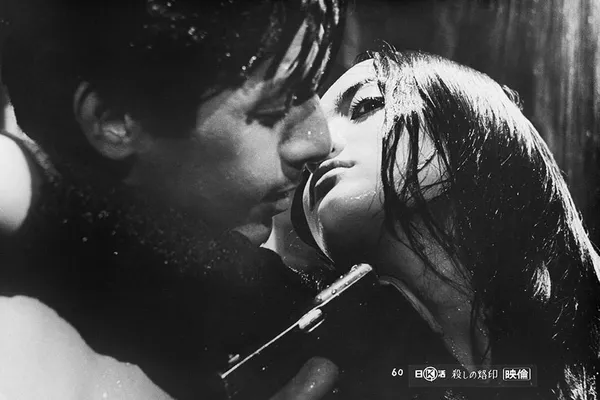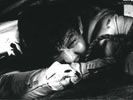Eye For Film >> Movies >> Branded To Kill (1967) Film Review

Ultra cool Japanese noir mixes with Sixiest surrealism to make this one of the hippest, trippiest, hitman movies you're likely to see this year.
Jo Shishido plays Hanada, "No. 3 Killer" in the rankings of best professional assassins in the Japanese underworld. He's aiming for the top, but no one knows who the mysterious No 1 is. A consummate, cold professional when he's on the job, his domestic life, for what it is, is less controlled. It seems to revolve around his doing nothing or obsessively smelling rice cooking, which acts as a pseudo-psychotic aphrodisiac leading to violent sex with his wife, Mami (Mariko Ogawa). All accompanied by achingly cool jazz tracks.

However, when he hooks up with the sultry, suicidal and dead-eyed Misako (Annu Mari) his life begins to unravel. When the hit she commissions him for goes wrong he ends up killing an innocent stranger, a total travesty in his profession. From then on he'll never make No. 1 and the other hitmen will hunt him down. Soon the jazz has gone, Hanada's feeling the pressure and things take a turn for the worse, and the slightly absurd.
Jo Shishido turns in a sterling no-holds-barred performance throughout. He's extremely watchable whether he's carrying out a hit, being flummoxed by the women in his life or damn near losing his sanity as dark forces move in around him. Still, this is a strangely beguiling mixed bag of tricks that very much belongs to its director, Seijun Suzuki, who went on to helm last year's Princess Raccoon.
Suzuki was a prolific filmmaker in the Sixties and he it seems he's thrown much of his learning and leanings onto the screen with Branded To Kill. Practically every shot is an artistically framed gem. Not only can Suzuki set them up well, he constantly experiments with his cameras, too. We get points of view from the killer, the victim, in silhouette, on cars, in cars, under cars, through mirrors, through gun sights, through film within the film, his inventive list goes on. It is a credit to his skill that he was achieving such artistic and technical virtuosity way back in 1967. Moreover, his grasp of stark noirish lighting only adds to how fantastic the film is to look at.
There are some terrific action sequences as well - such as Hanada's storming of a harbour tower - and some inventive, well-staged hits. Hanada's sharp suited, efficient style has clearly influenced many a western film since; one hit is unmistakably paid homage to in Ghost Dog: Way of the Samurai.
The editing is left effective, at times leaving continuity a little lacking, but it ultimately fits in perfectly well with Suzuki's more surrealist episodes. Ah yes, the surrealism. For every sequence that appears to drive the semblance of plot forward, there's one of opaque meaning, weighted down with psycho-sexual and subversive symbology. A butterfly alighting on Hanada's gun barrel causes his shot to hit an innocent passer-by; Misako's walls are plastered with butterflies and she's obsessed with dead birds; crudely animated rain falls on Hanada; the sex is bestial; a climax alone in a boxing ring; who is No. 1?
Sounds like The Prisoner, which is one way into the film, reading it as an extremely stylised Sixties take on the loner repressed by the societal control surrounding him, venting the animal passions within him. Considering the era in which Suzuki made this certain regions do stand up for such interpretations, especially the nameless No. 1's sonorous voice eventually grinding Hanada down. But with four script writers at work, Suzuki's frying up much more here.
With the deliberately perplexing style, graphic violence, nudity and, at times, disturbing sex scenes, Suzuki was braving his Japanese Sixties boundaries as much as possible and he carries it off with great aplomb, if that's your bag, man. It all makes for an intriguing film that entertains and frustrates in equal measure but that will definitely satisfying those with a more esoteric thirst.
Reviewed on: 28 Oct 2006



















